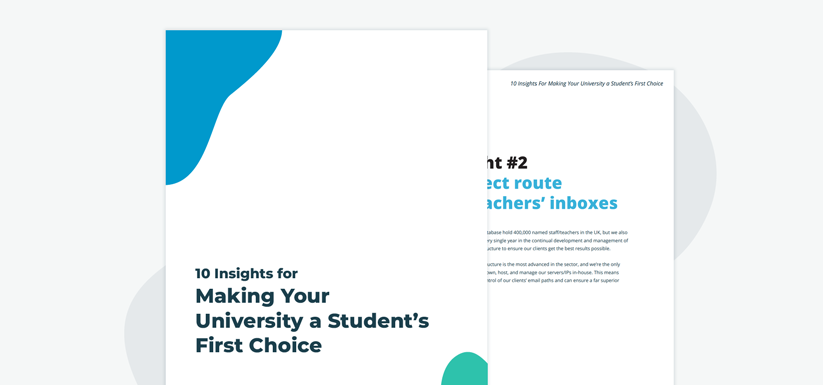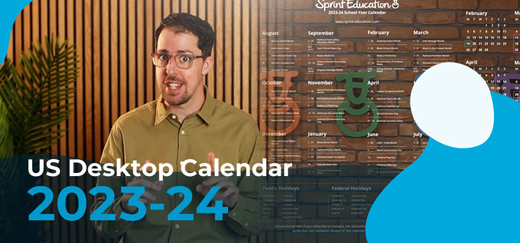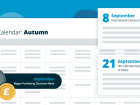Free Guide to the Gatsby Benchmarks
Free Guide to the Gatsby Benchmarks
Learn the eight Gatsy Benchmarks, and how they influence your edu-marketing strategies.
Learn the eight Gatsy Benchmarks, and how they influence your edu-marketing strategies.
If your education business offers a type of product, service, workshop, or support regarding careers, work experience, gap years, CVs, higher education guidance, life development, etc., then this presentation is a MUST read!
We’ve condensed down a “snackable” walkthrough of the recently released new Gatsby Benchmarks that are being introduced by the Department for Education.
To save you having to read tons of “government speak” yourself and then try and relay this information to your team, we thought we’d make your life easier and do the hard work for you.
THE NEW CAREERS GUIDANCE
What is it?
Statutory guidance from the Department of Education regarding ALL young people in secondary education.
Who is the guidance for?
Governing bodies, school leaders, school staff, and local authorities.
What does it say?
Every school and academy should use the Gatsby Charitable Foundation Benchmarks to develop and improve their career provision. t’s not statutory, but by following the guidance schools can be confident they will fulfil their legal duties. The government expects schools to start work to meet the benchmarks by 2020.
SCHOOLS ARE NOT ALONE
What is it?
The Government have given greater power and responsibility to The Career and Enterprise Company.
The Careers and Enterprise Company is a Government funded body, established in 2015 to help link schools and colleges to employers, in order to increase employerengagement for young people.
Their Role?
- Build Networks: Linking schools and colleges to employers and other external careers providers through the Enterprise Adviser Network and Careers Hubs.
- Support Careers Leaders: Providing training and support for Careers Leaders in schools and colleges.
- Back the Gatsby Benchmarks: Supporting implementation of a best practice standard for careers support, the Gatsby Benchmarks, with tools and targeted funding.
HERE ARE THE 8 GATSBY BENCHMARKS
1. STABLE CAREER PROGRAMME
- Every school should have an embedded programme of career education and guidance that can be understood by all.
- Each school must have a Careers Leader (separate from a Careers Advisor), and should focus on leadership, coordination, and networking).
- The programme must have the backing of the Senior Management Team.
- It is a legal requirement to publish on a school’s website information regarding careers programmes, contact information, and details regarding measurement, assessment, and impact of the programme.
- Schools should publish destination data and links to helpful resources.
- Schools should use ‘Compass Online Self Evaluation Tool’ for benchmarking.
2. LEARNING FROM CAREER & LABOUR MARKET
- Ensure every pupil and their parents/careers should have access to good quality information.
- Use Labour Marketing Information (an online data portal) to help young people understand salaries, promotion opportunities, and location salaries in the jobs market.
- Engage with the Department for Work and Pensions who offer support for schools regarding local job markets.
- Myth busting; emphasis that good careers information can support social mobility.
3. ADDRESSING THE NEEDS OF EACH STUDENT
- Raise the aspiration for all by tailoring to the individual.
- Prevent all forms of stereotyping, including gender, SEN, and disabilities.
- Maintain records that track progression for pupils to showcase to employers.
- Schools to use destination data to measure their success at providing career guidance, and tackling stereotypes and social mobility.
- Destinations should be accurately maintained three years after they leave a school (initial plan only).
- Encourage schools to publish schools data.
- Provide target support for vulnerable and disadvantaged people.
- Every young person should have an agreed post 16 plan.
- Schools, Local Authorities and FE/HE providers should share data on students to help support their needs, such as free school meals.
4. LINKING CURRICULUM LEARNING TO CAREERS
- Schools should ask all teachers to support careers; it is not just the responsibility of a Careers Advisor.
- Schools should deliver careers, employability, and enterprise lessons as part of their PSHE provision.
- By age of 14 all young people should be exposed to the world of work across a range of professions to understand the importance of GCSE subjects and their impact on progress.
- Schools should help pupils understand the particular importance of Maths.
- Pupils to understand that if they do not achieve grade 1 for Maths and English then they should continue working towards it in their 16 to 19 plan.
5. ENCOUNTERS WITH EMPLOYERS
- There is a clear correlation between careers talk and outside speakers, and higher returns in the labour market.
- Schools should help pupils gain practical attributes which will give them the confidence when entering the labour market.
- Schools should engage fully with local employers and professional networks.
- Pupils should participate in one meaningful encounter with an employer each year from age of 11.
- In practice this could mean: Careers fairs, employer mentoring, employer talks, and employer encounters with parents.
6. EXPERIENCE OF WORKPLACES
- Pupils should have first-hand experience of the workplace (one by age of 16 and two by age of 18).
- Schools should pay particular attention to workplace experiences for those with SEN.
- It should be high quality, meaningful work experience.
- This could include any of the following: – Part time work – Job shadowing – Volunteering – Work place visit
7. ENCOUNTERS WITH EMPLOYERS
- It is important that young people realise that all their educational choices have implications for their long term careers and their progression into Further or Higher Education.
- It must be made clear that young people are not required to stay in school; they can choose degree apprenticeships, internships, traineeships etc.
- There is now a legal duty that all academy maintained schools ensure there is an opportunity for a range or education and training providers to access all pupils for the purpose of informing them about technical qualifications and apprenticeships.
8. PERSONAL GUIDANCE
- Everybody should have opportunity for personal guidance interviews. One by the age of 16 and two by the age of 18.
- Schools should use qualified career professionals to provide personal guidance interviews.
- The Career Development Institute has released a set of professional standards for all Careers Advisers and guidelines for developing their skills and qualifications.
YOUR STRATEGY
Use this to your advantage!
The influence and success of a marketing campaign is always magnified when it can be linked to a relevant, current news story/development in school governance and guidelines.
Consider each of the 8 Gatsby Benchmarks; which ones can your product/service directly support or relate to?
Use this link as a key focal point within your marketing strategy.
Educate your audience how what you do will help the school/staff “tick off” the new regulations they have to be working towards for every pupil, every year of their secondary school life.
Communicate how what you offer will help the pupils in their career paths.
Want us to help you plan and execute a world-class marketing to schools campaign or strategy?
Our Education Experts are on hand to work with you to create a new plan that will mobilise teachers towards your brand and website, and ultimately help you sell more to schools. Simply contact us at:
E: info@sprint-education.co.uk T: 01684 297374
Tags
Education Marketing
Education News
How to Sell to Schools
How to Sell to Teachers
Selling to Schools
Selling to Teachers
Similar Articles


Marketing Universities to Schools
Learn 10 game-changing insights to make your university a student's first choice by enhancing your education marketing campaigns when emailing schools.


18 Education Marketing Hotspots for January and February 2024
Align your New Year campaigns with the education events teachers and school staff are prioritising, and watch your sales flourish.


Expert marketing to K-12 support and solutions
Expert marketing to K-12 solutions
Email Principals, Teachers, and District Staff Inboxes
Email teachers and staff inboxes
Sell More to US and Global Schools and Districts
Sell more to schools and districts
































